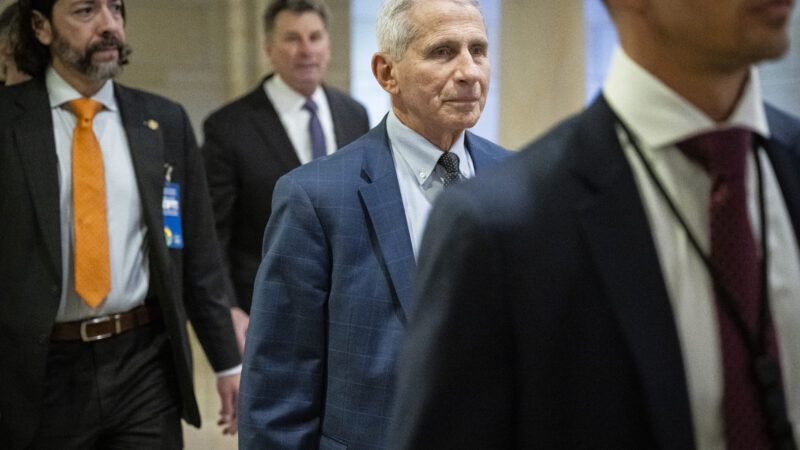Lab Leak Is Not a Conspiracy Theory, Anthony Fauci Concedes
The doctor's claims that he was open to either explanation is flatly contradicted by his literal words.

Former White House coronavirus advisor Anthony Fauci doesn't believe the lab leak explanation of COVID-19's origins is a conspiracy theory. He admitted as much during a closed-door grilling session before the House Select Subcommittee on the Coronavirus Pandemic on Monday. Legislators did not release a transcript of his testimony, but Rep. Brad Wenstrup (R–Ohio), the chairman of the subcommittee, published some highlights on X (formerly Twitter).
✔️Dr. Fauci acknowledged that the lab-leak hypothesis is not a conspiracy theory.
This comes nearly four years after prompting the publication of the now infamous "Proximal Origin" paper that attempted to vilify and disprove the lab-leak hypothesis.
— Select Subcommittee on the Coronavirus Pandemic (@COVIDSelect) January 10, 2024
In recent months, Fauci has denied he ever categorically rejected the possibility that COVID-19 accidentally escaped from a laboratory. But he faces very serious allegations that he deterred scientific experts from considering it. At issue is "The Proximal Origin of Sars-CoV-2," a paper that appeared in Nature Medicine, a scientific journal, in March 2020 at the very start of the global pandemic. Fauci—who was then head of the National Institutes of Allergy and Infectious Diseases (NIAID)—and Francis Collins—then director of the National Institutes of Health—participated in a conference call with the authors, whose initial openness to a lab leak explanation changed significantly prior to publication. The paper ultimately ruled out a lab leak as not just "unlikely"—the phrasing used in an early draft of the paper—but "improbable."
More recently, Fauci has contended that he always remained open to the idea, but was persuaded by scientific arguments—including those in the proximal origin paper—that a zoonotic spillover was more likely. This claim would be more persuasive if Fauci had not stated over and over and over and over again, in media interviews, that he "strongly favored" the zoonotic origin theory; his subsequent suggestion that he did not lean in either direction is flatly contradicted by his literal words.
"I wasn't leaning totally strongly one way or the other"
-Dr. Fauci pic.twitter.com/77hjmamKtc
— Matt Orfalea (@0rf) January 10, 2024
It was certainly in Fauci's interest to downplay the possibility that human experimentation on viruses accidentally unleashed COVID-19 upon the world; during his career, Fauci remained one of the foremost advocates of public funding for gain-of-function research, in which scientists manipulate viruses in order to make them deadlier and more transmissible. Fauci and other public health experts have straightforwardly denied that the U.S. funded such research in Wuhan, China, but critics say this is an exercise in semantics. Indeed, EcoHealth Alliance—a U.S. nonprofit that obtained public funding to conduct research on bat coronaviruses in Wuhan, China—was caught actively misleading Pentagon officials about the nature of the experimentation: Peter Daszak, the head of EcoHealth Alliance, advised colleagues to deceive regulators about the fact that the research would be conducted in China under laxer lab safety standards.
A cadre of elite scientists deliberately lied to U.S. security officials in order to spend American tax dollars performing risky experiments under substandard laboratory conditions in a notoriously secretive and authoritarian foreign country. Maybe those experiments created COVID-19, and maybe they didn't. In any case, it's clearly not a conspiracy theory; good of Fauci to recognize the obvious, however belatedly it might be.
One can debate the extent of Fauci's wrongdoing here—but it's the mainstream media that really dropped the ball in terms of lab leak discourse. The Washington Post was an early offender, accusing Sen. Tom Cotton (R–Ark.) of "repeating a coronavirus theory that was already debunked." The article explicitly applied the phrase "conspiracy theory" to the lab leak idea; The New York Times did the same, noting that the lab leak had been "dismissed by scientists." In fact, The Times' lead coronavirus reporter, Apoorva Mandavilli, went a step further, calling lab leak a racist theory.
Mandavilli's tone toward the lab leak was broadly representative of a whole host of mainstream journalists, media commentators, and so-called fact-checkers and misinformation experts. Following this flawed consensus, social media sites—including Facebook—brutally suppressed any and all discussion of the lab leak theory on their platforms. As recently as August 2023, The Journal of the American Medical Association was still counting lab leak discourse online as evidence of the unstoppable spread of misinformation online. And the Global Disinformation Index—a British non-profit that received funding from the State Department, and tarred Reason as an unsafe news website—warned that blaming the pandemic on a lab leak could lead to racist attacks on Asian people.
That's a long way of saying that self-appointed misinformation cops went to great efforts to censor and stigmatize this topic of conversation, on grounds that it was either racist, or a conspiracy theory, or both. Yet it is neither; even Fauci says so. One might hope that this would prompt some self-reflection within media circles. The anti-misinformation crowd wasn't just wrong—they were militant that it was of vital importance to stop everyone from even contemplating the possibility of a lab leak theory.
There's a perniciousness underlying this attitude, and one that clearly threatens free speech, as many U.S. political figures—including President Joe Biden and Sen. Elizabeth Warren (D–Mass.)—have decided that the federal government should do more to combat purported misinformation. They might consider whether they themselves have been misinformed.


Show Comments (96)